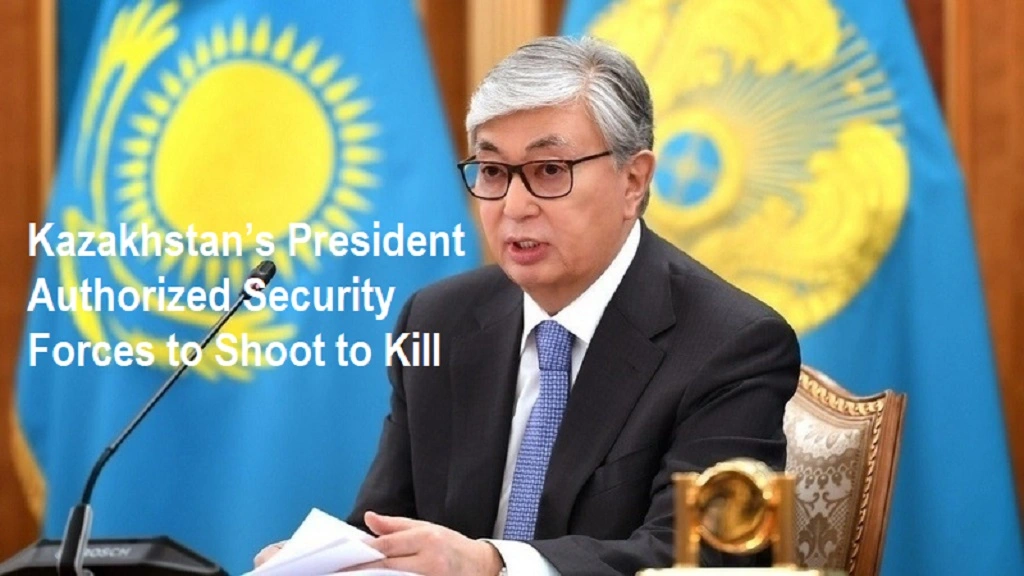Kazakhstan’s president, backed by both China and Russia, authorized security forces on Friday to shoot and kill those participating in unrest, paving the way for a dramatic escalation in a crackdown on anti-government protests.
It has been three decades since Central Asia gained independence from the Soviet Union, and dozens have lost their lives in street protests this week. In response to a near-doubling of the price of vehicle fuel, demonstrations spread quickly across the country, reflecting wider discontent with authoritarian rule.
During a televised address to the nation, President Kassim-Jomart Tokayev used harsh language to refer to those involved in the turmoil as “terrorists,” “bandits,” and “militants” – but it remains unclear how peaceful protests turned violent.
As of yet, no anti-government leaders have emerged.
In a statement, Tokayev said he had given the order for law enforcement and the armed forces to shoot to kill without warning. Anyone who does not surrender will be killed.
Moreover, he attacked some countries’ calls for negotiations with the protesters as “nonsense.” “What negotiations can be held with criminals, murderers?” Tokayev said.
26 protesters killed in Kazakhstan
The Interior Ministry of Kazakhstan announced on Friday that 26 protesters had been killed by security forces during the unrest, which erupted on Wednesday. Another 26 protesters were wounded, and more than 3,800 people were detained. According to reports, 18 law enforcement officers have been killed and over 700 have been injured.
As the protests turned violent, with people storming government buildings and setting them ablaze, it was not clear if more people had died in the melee.
The crackdown has caused internet service to be severely disrupted, and several airports have been closed, including one in Almaty, Kazakhstan’s biggest city. As a result, it has been difficult to receive news from inside the country. Cell phone service has also been severely disrupted.
On Thursday, Tokayev appealed for assistance from the Collective Security Treaty Organization, a military alliance led by Russia. Kazakstan’s neighbours, particularly Russia, are concerned that the unrest could spread.
On Friday morning, more skirmishes were reported in Almaty. Russian state-run news agency Tass reported that fire had broken out at the building housing the Kazakh branch of the Mir broadcaster, which was funded by several once-Soviet states.
Harsh measures to end the unrest
On the other hand, life began to return to normal in other parts of the country. Astaty airport was once again under law enforcement and CSTO control after the protesters stormed and seized it earlier, Russian Defense Ministry spokesman Major General Igor Konashenkov said on Friday.
A spokesperson for the airport told local TV station Khabar 24 that the airport will remain closed until Friday evening.
Before authorizing the use of lethal force against those participating in the unrest, Tokayev implied that some calm had returned, saying that “local authorities were in charge.”
Despite several attempts to appease protesters – including a 180-day fuel price cap and a moratorium on utility rate increases – Tokayev has promised harsh measures to end the unrest.
After Tokayev called on the CSTO alliance for assistance, fears of a broader crackdown grew. Kazakh media reported that 2,500 soldiers have already been brought to Almaty, according to foreign ministry officials.
The Kazakh government has stated that troops from the alliance, which includes several former Soviet republics, will not fight demonstrators, but instead will guard government institutions. Although it was unclear if foreign troops had been involved in suppressing unrest, reports indicated that they had been.
Tokayev reiterated in his address to the nation that “foreign actors” and “independent media” were responsible for causing the turmoil.
Despite his lack of evidence, such rhetoric has been used by former Soviet nations, most notably Russia and Belarus in recent years in order to suppress mass anti-government demonstrations.
Kazakhstan borders Russia and China
Kazakh territory is about the size of Western Europe, borders Russia and China, and sits atop colossal oil, natural gas, uranium, and precious metals reserves – which made the crisis all the more concerning.
Effacem Macron, the French president, urged a de-escalation as European Commission president Ursula von der Leyen expressed grave concern.
According to spokesman Christofer Burger for the German Foreign Ministry, officials are investigating Tokayev’s shooting order. According to Germany, using lethal force against civilians, particularly when military forces are involved, is only an extremely last resort.
However, China appeared to step up its support for Kazakhstan’s government on Friday.
Kazakhstan is a critical link on China’s “Belt and Road” overland route to Europe, and persistent unrest in the country could undermine Beijing’s hopes for closer political and economic ties with Europe.
Tokayev’s actions at critical moments and swiftly calming the situation were praised by Chinese President Xi Jinping in his condolences over the “large-scale riot.”
China, as a long-term strategic partner and a fraternal neighbour, is willing to provide Kazakhstan whatever support it can within its means to help it get through this difficult time,” Xi said.
Kazakhstan has enormous resources, but poor living conditions are a major cause of discontent in some areas. Kazakhstanis also resent the dominance of the ruling party, which holds more than 80% of parliament seats.
Source: The Associated Press






